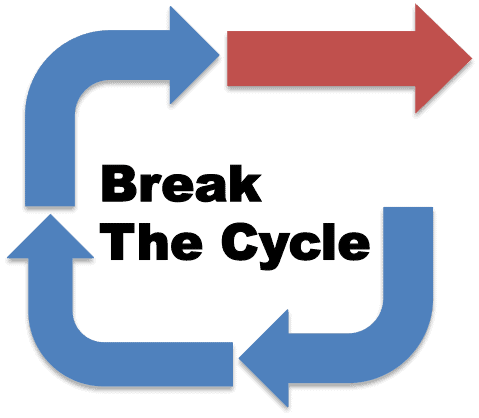In our interrupt driven society it is easy to get drawn into the trap of reactive management. It can even feel good, because you're being so "responsive" and "available" by letting team members ping you any time and always responding right away.
You can sit for hours in email doing your best to keep up with a deluge of messages. You can feel important by saying yes to every meeting without considering whether you really need to be there.
Being reactive can feel good in those moments, but the longer you do it, the shorter term your thinking becomes.
While you're reacting to every little thing coming your way, there are long term problems forming: small team issues you should get out in front of are growing, long term planning that will keep your team focused on the right things aren't happening, and you may be failing to get the most important of your own work done.
Making matters worse, the more you put off the long term work, the more they create short term issues. You will have to deal with those problems when they boil over and then demand immediate, significant attention, or your team drifts in a direction better planning could have avoided.
So what's a manager to do?!?
You must take control and break the vicious cycle of reactive management.
How to Break the Vicious Cycle of Reactive Management
1) Make one-on-ones sacred
The best way to prevent a big problem is to fix it when its small. Unfortunately, with all you have going on as a manager, it's hard to detect those problems when they're small.
Your team members will likely respect your time and won't want to come to you with every little problem as they come up. To make sure you don't miss those issues that could be a big deal in a few weeks or months, you need to make sure you're having your one-on-ones often enough to hear about them then.
The unstructured, lower pressure environment of a one-on-one is perfect to not only uncover the problems, but work with your team members to find the right solution.
A little coaching and quick fixes coming from your regular one-on-ones will prevent a lot of problems from blowing up later on. If they always know they can count on talking to you in a one-on-one, they're less likely to need to come to you ad-hoc, or worse, bottle something up and never bring it up to you.
To ensure this happens, make your one-on-ones sacred: never cancel one-on-ones. If you absolutely can't make it, reschedule so they know that time is as important to you as it is to them.
2) Schedule your open door and your creative time.
As a manager, you need time to think at a high level about priorities, projects, and your team. Unfortunately, you can't do that in the 5 minutes between other meetings and people popping into your office.
Open slots on a calendar have a knack for being filled up. Take back your time by scheduling your creative time (ideally 90 min blocks) and make your door "open" at set times (some call them office hours) that your team can count on, but that doesn't consume your whole day. You'll be surprised how much you can get done by doing this.
Intel tried this method of blocking off time for focused work and found that not only did workers love it, but the results were the development of new, patentable technology with just a few hours a week of this time.
Your time is valuable. Your calendar determines how you invest it.
3) Time-box email time.
It's so easy to live in your inbox. There's always one more message coming that you could respond to. It may even be from customers, who you clearly want to provide great service. However, if you're constantly checking your inbox, that distraction comes at a high price.
Research at UC Irvine found that after an interruption, it can take up to 23 minutes to regain focus on your original task. With your busy schedule as a manager, that could very well mean a distraction prevents you from having time to complete your tasks or having to complete it without using your full mental strength.
A great way to ensure you avoid the distraction of email is to schedule your email time as well. By setting aside a few times in the day when you'll check, you can give yourself peace of mind to not worry about it while you focus on your current task.
Scheduling when you email also helps you better control your inbox; if people know that urgent issues do not belong in your inbox, then you train them to decide either:
A) You're not really needed for that decision (you empower and trust your team on this) or
B) Use other methods for real emergencies (like private chat, coming to your desk, or a phone call).
In both cases, you have eliminated some messages that would have otherwise hit your inbox, so you won't have to deal with them when you do reach your scheduled time.
Note: I learned both these scheduling hacks from The 12 Week Year. I have been using the book's recommendations to really help transform my effectiveness and break out of reactive management.
4) Ask people to put the real subject of emails in the subject line
Now that you're getting your time back and more effectively managing your email, you can become a real pro by working on you and your team's email subject lines to have them describe exactly what the email is about.
I learned this hack from The Ultimate Sales Machine:
"Change the subject line as you change the content of the email....This way, everyone in the company can glance at an incoming email and make the decision, "Can I deal with this now if I open it?"...email is there for your convenience. If it's not convenient, don't answer it."
This further ups your email game because now you can recognize when you can handle something in 5 minutes or less even before you open to read the email.
Meanwhile, issues that are obviously larger projects (like a big discussion on product development cycles or legal documents) can be left untouched until one of your scheduled times to go through all your email.
By combining this subject line hack with your scheduled email time, you can greatly reduce the emails you receive *and* better manage them once you have received them.
5) Set reminders to give you peace of mind
With so much going on, it's very difficult to keep everything straight in your head. Your short term memory has limits on how much it can hold, and every distraction makes you more likely to forget important things.
Instead, your best bet is to get organized and use systems you can trust.
- Follow ups: Why force yourself to remember to follow up with someone when Boomerang or Followup.cc will automatically bring that email back to the top of your inbox when you need it?
- Your team: Why try to remember everything about your team members, their goals, and what you talked about in your last one-on-one.
- Your Calendar: Why try to remember when you'll be available for a meeting next, and do all your own booking through lengthy email threads, when you can use an app like ScheduleOnce to share your calendar in real time and manage booking for you?
If you use tools to set reminders you can let those items leave your immediate memory and focus on the task at hand. The more you trust your systems, the more they'll work for you and you can jump into the right things only at the right time instead of having to react to forgotten items or deal with issues when you didn't plan to.
---
Your mental power and your time are the biggest constraints as a manager. You were promoted because you're talented, intelligent, and hard working. These hacks can help you work smart, not just hard.
What are your favorite productivity hacks that helped you get out of reactive management mode?





